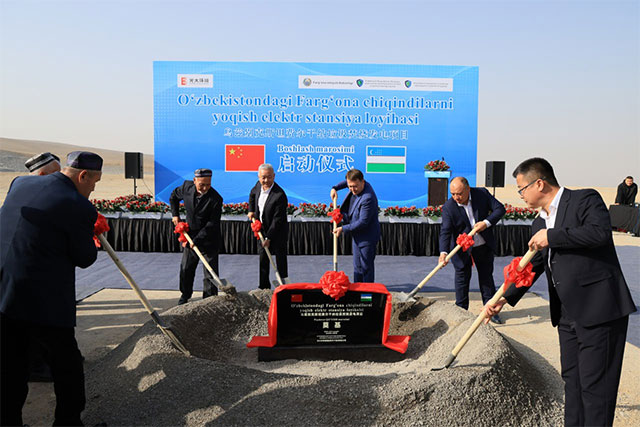
Ferghana Launches Waste-to-Energy Plant Construction
Ferghana Launches Waste-to-Energy Plant Construction
Tashkent, Uzbekistan (UzDaily.com) — In the Okbilol village of Ferghana District, a groundbreaking ceremony was held to mark the start of construction for a facility that will generate electricity by incinerating municipal solid waste.
The event was attended by Ferghana’s deputy hokims Nuriddin Mamadjanov and Hakimjon Dolimov, representatives of the Chinese company China Everbright International Ltd, investors, and officials from relevant government agencies.
The project is being implemented in accordance with the Presidential Decree of the Republic of Uzbekistan dated 24 March 2025, “On Measures for the Implementation of the Investment Project for Electricity Generation from Municipal Solid Waste in Namangan and Ferghana Regions.” The decree provides for the attraction of US$141.5 million in direct investments and the deployment of modern equipment capable of processing up to 1,500 tons of waste per day, generating 227.5 million kWh of electricity annually.
In Ferghana, the US$150 million investment project is being launched by China Everbright International Ltd, one of the world’s leading companies in green energy and waste processing.
Deputy hokim Nuriddin Mamadjanov emphasized that Uzbekistan is actively implementing large-scale environmental initiatives aimed at developing a green economy, improving waste management, and introducing modern processing technologies. He noted that the project will not only enhance the region’s energy sustainability but also make a significant contribution to improving the local environmental situation.
Wei Junbo, Director of China Everbright International Ltd, stated at the ceremony that the successful implementation of such projects is made possible by mutual trust and the strategic partnership between Uzbekistan and China. He expressed confidence that the project would serve as a model for effective cooperation in sustainable development and environmental protection.
The new facility will process up to 547,000 tons of municipal solid waste per year (1,500 tons per day) using an environmentally safe thermal method, producing 227.5 million kWh of electricity annually. This will significantly reduce the volume of waste sent to landfills, lower environmental impact, and strengthen the region’s energy security.
The project will create approximately 400 new jobs, and local specialists will have opportunities for training and professional development using modern technologies.
The ceremony concluded with a traditional blessing by local elders and a symbolic laying of the first stone, marking the official start of this important environmental and energy initiative for the region.